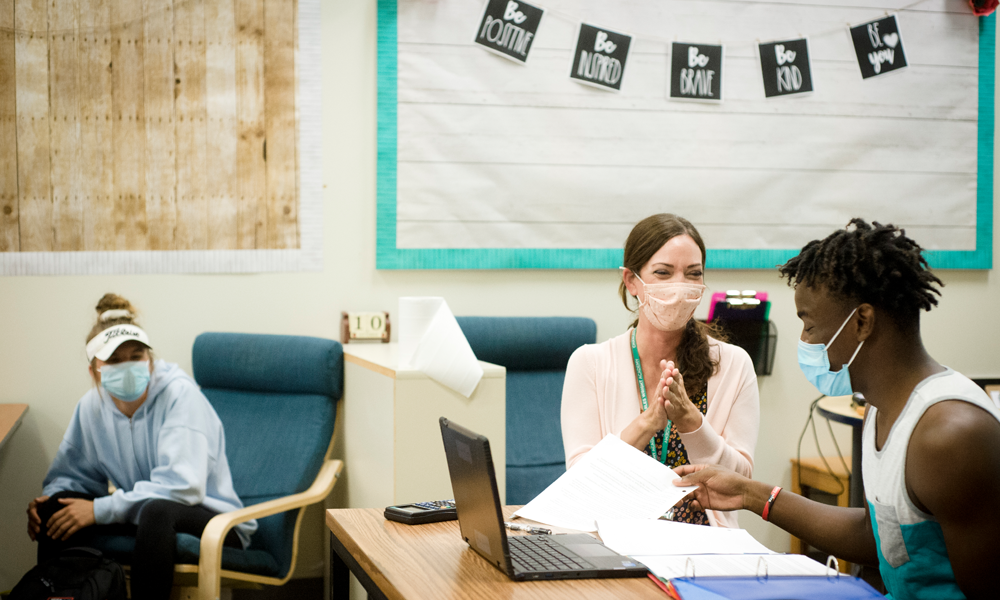Upper School learning specialist Carrie Cherek works with students in the Learning Resource Center.
Student Support at Charles Wright
A new school-wide leadership team focuses on social-emotional health across all grade levels
by Kimberly Banti
As Tarriers dove into their third academic year affected by the Covid-19 pandemic, CWA administrators and faculty teamed up in new ways to better tailor student support at the divisional, grade, and even individual level to improve social and emotional learning.
An all-school student support team formed this year provides a resource for faculty members to communicate any concerns about a particular student so that a comprehensive and holistic response can be implemented as soon as possible.
The team consists of Director of Upper School Bill Schuver; Director of Diversity, Equity, Inclusion, and Belonging Denise Riordan; Director of Counseling and Wellness David Bishop; Director of Student Life Annie Senner; Director of International Programs Crysta Swarts-Gillison; Upper School Learning Specialist Carrie Cherek; Middle School Learning Specialist Lisa West; and Lower School Learning Specialist Mary Cole.
Though student support teams met at the divisional level prior to this year, “a big advantage to having an all-school student support team is that we can aggregate all of the information and be able to strategize in collaboration across all grade levels,” Mr. Bishop said. The team reviews each referred student’s case by discussing their social-emotional well-being, mental health, and academic or learning needs while also reflecting on the student’s strengths and connections within the CWA community, be it with a specific teacher or a peer group. Then they discuss how to partner with the student, their family, their teachers, and any external resources or medical professionals who can best meet that student’s particular needs.
“Growing a larger network of professional external resources is something we can continue to develop,” Mr. Schuver said. “We are working to partner better with parents and guardians to find strategies to provide tailored support. What we’ve realized is that we are not just educating the students; we are an educational institution that needs to support the entire family. That’s come into stark relief during Covid and something that we can carry forward.”
Ms. Cole has seen this deeper collaboration with families expand throughout this fall. “Although student support has changed over time, we continue to focus on our values of compassion and respect for each child’s individual needs,” she said. Thus far during the pandemic, “we’ve learned that our family education programs improved when families could attend school events virtually. It is exciting to see an entire family—including grandparents—have the opportunity to attend a child’s conference. Just today I was in a parent-teacher conference, and a father who is deployed in Poland was able to celebrate their child’s success with us.”
Professional development opportunities expand the reach outside the core student support team so that all faculty members are equipped to identify needs and work toward solutions. Ms. Senner referenced recent work with nonprofit organization No Bully: The Power of Zero, and Mr. Bishop noted programs such as the University of Washington’s Forefront in the Schools and Harvard’s Making Caring Common as educational resources for work in suicide prevention and building and sustaining compassion, respectively.
Ultimately, all Tarriers own a piece of this important work. “It is every member of our community’s job to ensure that our students can fully participate as their authentic selves,” Ms. Riordan said. “It is every community member’s job to ensure that our students feel like they have a place here at Charles Wright and that they truly belong.”


